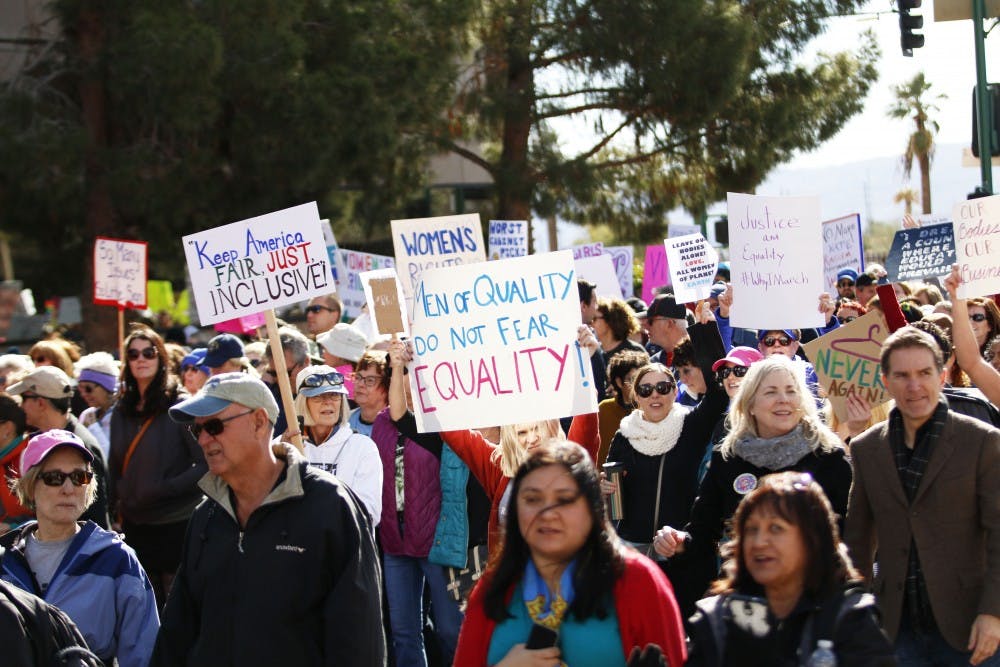We marched for love. We marched for hope. We marched for every moment we have ever felt less than equal.
After President Donald Trump’s victory in November, outrage spread like wildfire. Women from all over the country organized a march on Washington, planned for the day after Trump was sworn into office.
It was originally titled the “Millions Women’s March,” but eventually became referred to as the “Women’s March on Washington.” Soon enough, 10 sister marches in Arizona, including one in Phoenix, were organized in association with this event.
While some people may argue that peaceful protests do not accomplish anything, the march did make a difference. These demonstrations made national news, as millions of people from all over the world flooded the streets. The Washington D.C. march alone was larger than Trump's inauguration crowd.
Most individuals in attendance stood in support of Planned Parenthood, the Affordable Care Act, and LGBT+ rights.
Several members of the local community spoke before the Phoenix march began. One of which was Athena Salman, an ASU graduate, and a representative for District 26 in the Arizona House of Representatives.
“We gather here today in a march for women, not to silence or diminish the challenges that others face, for oppression and privilege impacts each of us uniquely," Salman said. "We march for women to highlight specifically the barriers that diverse women face in our country today.”
The Trump administration is gearing to repeal the Affordable Care Act which would mean many students would lose coverage from their parents’ insurance at the age of 21 instead of 26.
Trump’s election alone has caused students of color to face a higher risk of being discriminated against. For example, the number of racially charged crimes has escalated post-election.
Additionally, every member of Trump’s newly appointed cabinet has a history of being anti-LGBTQ+. This is why such protests are important.
“So many diverse people attend ASU, and I saw how this election would affect every single one of them,” Natalie Kilker, an ASU senior and global studies major said.
It is important to realize, however, that these protests did not address gender alone. Over 20,000 people walked in Phoenix for intersectional feminism.
Intersectional feminism, is the advocacy for the rights of women of all ethnicities, sexualities, religions, abilities and socio-economic backgrounds. It’s the feminism that doesn’t leave anybody behind.
We cannot continue to participate in a feminism that excludes women who are not white. We need to fight for the rights of women of color, gay women, bisexual women, trans women, Muslim women, Jewish women, disabled women, and every woman in between.
There are many ways in which we can contribute to this battle for love and equality.
For starters, you can visit the Women’s March website and join their “10 Actions for the First 100 Days.” Their first call to action is to begin writing and sending postcards to your senators.
In Arizona, the senators are John McCain and Jeff Flake. You can also donate to organizations such as Planned Parenthood, The Trevor Project, and UltraViolet.
In addition, volunteering and donating for campaigns that you strongly believe in can make a difference as well. Organizations such as She Should Run help promote women in politics.
Just remember, we must take a stance. Stand up. Make your voice heard. We have the First Amendment for a reason.
Reach the reporter at simone.rossi@asu.edu or follow @simonekathleen9 on Twitter.
Editor’s note: The opinions presented in this column are the author’s and do not imply any endorsement from The State Press or its editors.
Want to join the conversation? Send an email to opiniondesk.statepress@gmail.com. Keep letters under 300 words and be sure to include your university affiliation. Anonymity will not be granted.
Like The State Press on Facebook and follow @statepress on Twitter.




